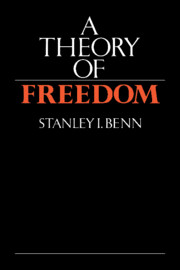Book contents
- Frontmatter
- Contents
- Foreword
- Preface
- Acknowledgments
- 1 Persons and values
- 2 Practical rationality and commitment
- 3 Reasons in conflict: Quandaries and consistency
- 4 Values and objectivity
- 5 Natural personality and moral personality
- 6 The principle of respect for persons
- 7 Freedom of action
- 8 Freedom as autarchy
- 9 Autonomy and positive freedom
- 10 Autonomy, integration, and self-development
- 11 Self-realization, instinctual freedom, and autonomy
- 12 Autonomy, association, and community
- 13 Human rights and moral responsibility
- 14 The principle of privacy
- 15 Interests in privacy
- 16 Conclusion: A semantic theory of freedom
- Notes
- Index
11 - Self-realization, instinctual freedom, and autonomy
Published online by Cambridge University Press: 04 December 2009
- Frontmatter
- Contents
- Foreword
- Preface
- Acknowledgments
- 1 Persons and values
- 2 Practical rationality and commitment
- 3 Reasons in conflict: Quandaries and consistency
- 4 Values and objectivity
- 5 Natural personality and moral personality
- 6 The principle of respect for persons
- 7 Freedom of action
- 8 Freedom as autarchy
- 9 Autonomy and positive freedom
- 10 Autonomy, integration, and self-development
- 11 Self-realization, instinctual freedom, and autonomy
- 12 Autonomy, association, and community
- 13 Human rights and moral responsibility
- 14 The principle of privacy
- 15 Interests in privacy
- 16 Conclusion: A semantic theory of freedom
- Notes
- Index
Summary
Self-realization
Many writers influenced by the neo-Freudian ideas of ego-autonomy discussed in Chapter 10 have looked to the notion of “self-realization” for a personality ideal somewhat more substantial and more specific than integration. The idea that the personality has some kind of essence, struggling for realization or free expression – that positive freedom consists in actualizing this ideal self – is a recurrent theme in moral and social philosophy. It was central to T.H. Green's concept of moral freedom, a man's reconciliation “to ‘the law of his being’ which … prevents him from finding satisfaction in the objects in which he ordinarily seeks it, or anywhere but in the realisation in himself of an idea of perfection.” As a subject of rational will, all his action is, in an ideal sense, oriented to “self-perfection,” though he may be mistaken in seeking it where it is not to be found. But the “law of his being,” which is reason, is also the moral law. Reason and will are “expressions of one self-realising principle.” If all men are seeking the same rational self-realization, the conditions for its achievement tend, albeit imperfectly, to a concrete expression in what Green, following Hegel, took to be the historical manifestation of reason in the conventional moral code and in traditional institutions.
Neo-Freudian self-realization theorists, such as Erich Fromm and Karen Horney, would certainly reject the identification, even in principle, of the real and the ideal.
- Type
- Chapter
- Information
- A Theory of Freedom , pp. 199 - 212Publisher: Cambridge University PressPrint publication year: 1988



